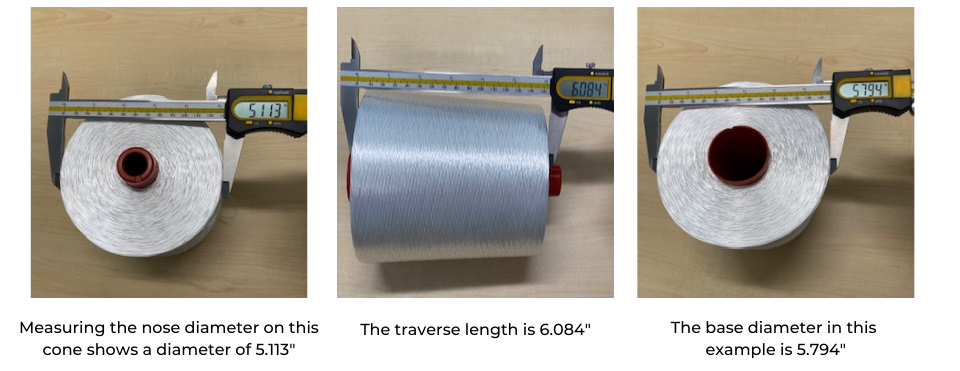Hose manufacturing partners running high tenacity polyester, nylon and para-aramid yarns all strive for one thing: lower manufacturing costs. There are many cost cutting methods, but the most effective are automation and faster line speeds. Faster line speeds often depend on equipment capabilities, design and material supply.
On spiral winders, optimum package placement must be available to attain the highest speeds. The smaller the radius from the line center to the package center, the higher the line speeds possible. The supply package must also have unyielding integrity and density for optimum performance and blow-out prevention.
Coned Yarn “Blow Out” Risk Factors
Cones may look good on top, bottom and traverse length — but at maximum diameter they might weigh only 3.75 pounds instead of 4.0 pounds. This could mean they’re softer and may not resist the centripetal forces created by angular speed, velocity, and package weight.
As part of Service Thread’s package development program, we will identify the centripetal force to which a package will be exposed. In simple terms the equation for centripetal force is:
F = mv2/r
F = Force
m = Mass
v = Velocity
r = Circular Radius
For example, if our package weighs 4.0 Lbs (1.8144 Kg), with a radius of 7” (0.1778 m) and a typical spiral deck speed of 2,000 rpm (37.24 m/s), the centripetal force (F) will be 14,149 Newtons which is equivalent to 3,180 lbf.
Service Thread’s objective would then be to design a package that allows the deck speed to reach at least 3,000 rpm. This would mean designing a 4.0 Lb package which will withstand a minimum of 7,154 lbf (31,835 Newtons). Package density has now become a very important part of the design. Equally important is the wind ratio locking the yarn in place, whether flat or twisted.
Data Collection Tools
Increasing package density along with angular velocity leads to increased line speed and reduced downtime, ultimately creating greater outputs.
By quantitatively measuring and tracking package density, Service Thread has been able to determine optimum package requirements for Spiral Winders and Servers. Line operators no longer have to use the “thumb test” to decide if the package is firm enough to process at 3,000 rpm.
Four simple measurements loaded into our density calculator will quickly determine if the density is at a safe level (a min. 0.900 g/cm3). Firstly, the package base, top and traverse lengths must be measured to determine the package’s volume (cone volume must be measured and subtracted). This must then be divided into the weight to obtain density. The formula is:
V = πh(d²+db+b²)/12
V = Volume
h = height (traverse length)
b = base diameter
d = nose diameter
Density (g/cm3) = Cone Weight (g) / Volume (cm3)
In the following example we measure a 4.30 pound package and use this formula to calculate the density.

Using the measurements on this 4.30 pound package in the above example, the density calculates to 0.913 g/cm³. Using this calculation, density can be objectively measured rather than relying on how “soft“ the base or nose of a package feels.
We’ve found maintaining a minimum of 0.900 g/cm3 is optimal for cones used on high speed spiral winders for hose reinforcement applications. For slower speed operations lower densities may work however higher densities are generally better for all applications.
Service Thread Solves Problems
Service Thread provides the world’s most reliable, American-made industrial yarn threads customized for your processing application. Industrial thread and yarn are 100% of our business. Learn more about our services and get information about all the ways we can help you by visiting our website.
We provide free consultations on all fit industrial sewing thread applications, textile yarn processing, and design/modification for processing equipment. Request a service call by dialing 1-910-277-7456 or e-mailing sales@servicethread.com.


